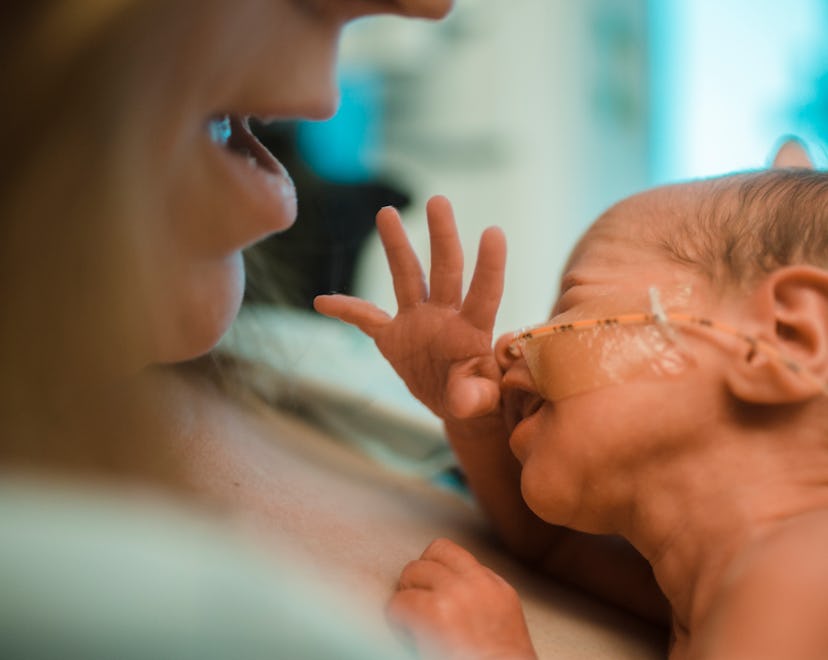
Having A Preemie Baby Affects Your Mental Health In A Big Way — Here's How To Cope
Remember to be kind to yourself
If you are a parent of a preemie, chances are good your postpartum period was anything but common. Even if your baby was perfectly healthy, the experience might have left a lasting mark on you because of how having a premature baby can affect your mental health. It's hard to be prepared for the unexpected, and coping with it can be difficult.
Under normal circumstances, all women are at risk of developing some kind of postpartum mood disorder, but moms of preemies are at an elevated risk, and so are their partners, especially if the baby had a stay in the Neonatal Intensive Care Unit (NICU). Licensed Professional Counselor-Supervisor and maternal mental health specialist, Lacey Fisher, LPC-S, RPT-S, tells Romper via email, "Having a child that is born premature and needs to go to the NICU increases the risk of parents experiencing perinatal mood and anxiety disorders as this can be a very traumatic experience for parents." Additionally, she says, "If the birthing [partner] is experiencing postpartum depression or anxiety, this increases the chance that the non-birthing partner could experience this as well."
"Unfortunately, they frequently aren’t even asked if they’re okay, which is sort of a second tragedy of it all," Kellie Wicklund MA, LPC, PMH-C, licensed psychotherapist and clinical director of the Maternal Wellness Center in Pennsylvania says.
In addition to postpartum depression and postpartum anxiety, Fisher explains that parents of preemies are more at risk of postpartum post-traumatic stress syndrome (PTSD) and postpartum obsessive-compulsive disorder. She says, "Postpartum Support International suggests that approximately 9% of women deal with postpartum PTSD following childbirth. There is also grief around not having a positive birth experience or possibly dealing with the grief of the death of a baby in the NICU." Wicklund agrees, and notes parents of preemies are also more likely to suffer from adjustment disorder and acute distress reaction as well.
Each of these mood disorders looks a little different on everyone, but there are some behaviors or feelings parents may present that could be telling of the state of their mental health. Wicklund says parents experiencing anxiety will notice "symptoms of chest tightness, shortness of breath, [and/or] obsessional thinking." Fisher says parents may also show symptoms like "isolation, withdrawing from others, not engaging in activities they normally like to do, extreme worry or scary thoughts, rigid behaviors and/or grief."
She further explains parents of NICU babies may come home and feel the need to wash their hands as frequently and vigorously as they do at the hospital or feel an overwhelming sense of fear when they bring the baby home because they can no longer rely on the NICU staff and monitors to track their baby's health. Parents of a preemie may also have a more difficult time bonding with their baby and could even have a sense of detachment "a way of protecting against impending loss and grief," says Wicklund.
While these feelings and behaviors may be common amongst parents of premature babies, that doesn't make them any easier to live with. Finding ways to cope with and work through these feelings is essential because suppressing them won't work, "it is not a question of if it will come back to bear down on us. It will," explains Wicklund. The best thing parents of premature babies can do is connect with someone to process what they went through, whether it's a therapist or support group of some kind.
In addition to finding support, Fisher recommends parents practice mindfulness, remind themselves of their child's strength instead of focusing on their risks, and generally being kind to themselves. "It's important that parents know they are not 'crazy' for having extreme anxiety or trauma after an experience in the NICU, no matter the length of the stay," she says, "there is no right or wrong way to cope with this and that each person has a unique healing journey."
Both Wicklund and Fisher stress the importance of parents of preemies not downplaying their feelings and experience. Fisher says, "I like to remind my [patients] that each healing journey is unique and even if their baby is now safe at home, even if their baby didn’t stay in the NICU as long as other, and no matter how long ago it happened, they still had a time when they didn’t know everything would be okay. These parents have a right to cry, to grieve, and to continue healing no matter how long it takes."
If you or someone you know is experiencing depression or anxiety during pregnancy, or in the postpartum period, contact the Postpartum Health Alliance warmline at (888) 724-7240, or Postpartum Support International at (800) 944-4773. If you are thinking of harming yourself or your baby, get help right away by calling the National Suicide Prevention Lifeline at 1-800-273-8255, or dialing 911. For more resources, you can visit Postpartum Support International.
Experts:
Lacey Fisher, LPC-S, RPT-S, Licensed Professional Counselor-Supervisor and Registered Play Therapist-Supervisor with a specialty in Birth Trauma, NICU, Sexual Abuse, and Birth
Kellie Wicklund, MA, LPC, PMH-C, Licensed Psychotherapist, and Clinical Director of the Maternal Wellness Center. You can listen to Kellie discuss this topic more as a guest on the Today Is A Good Day podcast.
This article was originally published on